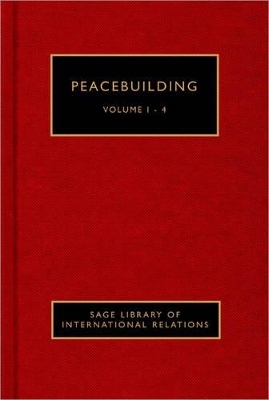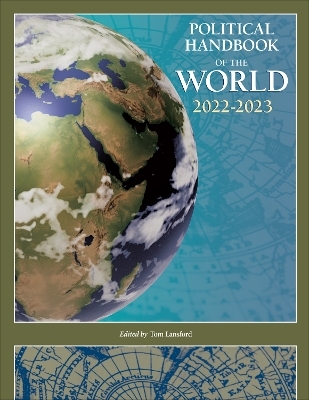
Peacebuilding
SAGE Publications Ltd
978-1-4462-7222-0 (ISBN)
This new 4-volume Major Work showcases the main debates and controversies associated with peacebuilding. In particular, this collection seeks to go beyond a simple explanation of peacebuilding institutions and projects to unpack the ideas and ideologies that underpin the subject. Recent years have seen a large increase in the academic and policy literature on peacebuilding. They have also seen significant successes and failures in peacebuilding, reforms among international organisations (such as the United Nations and World Bank), and increased prominence awarded to local peacebuilding actors. The articles in this major work capture these changes and collectively present a state-of-the-art account of contemporary peacebuilding.
Containing diverse perspectives, including from scholars from the global south and global north, and from scholars with different methodological standpoints, this collection is designed with academics as well as practitioners in mind.
Volume 1: Ideas and Foundations
Volume 2: Actors
Volume 3: Issues
Volume 4: Contexts
VOLUME ONE: IDEAS AND FOUNDATIONS
The Evolution of Peacebuilding - Stephen Ryan
An Agenda for Peace, Preventive Diplomacy, Peacemaking and Peace-Keeping - UN
Social Forces, States and World Orders: Beyond International Relations Theory - Robert W. Cox
The Problem-Solving and Critical Paradigms - Michael Pugh
Peace Research and Politics - Herman Schmid
Small Peace - Paul Smoker
Peace and Development: Towards a New Synthesis - Jon Barnett
Peace Culture and Social Action - Elise Boulding
Civil War Settlements and the Implementation of Military Power-sharing Arrangements - Matthew Hoddie and Caroline Hartzell
International Peacebuilding: A Theoretical and Quantitative Analysis - Michael Doyle and Nicholas Sambanis
Civil War Peace Agreement Implementation and State Capacity - Karl DeRouen et al.
International Peacebuilding and the ‘Mission Civilisatrice’ - Roland Paris
The False Promise of Peacebuilding - Ian Spears
A Genealogy of Peacemaking: The Creation and Re-creation of Order - Oliver Richmond
Do the Root Causes of Civil War Matter? On Using Knowledge to Improve Peacebuilding Interventions - Susan Woodward
Peacebuilding Does Not Build Peace - Tobias Denskus
The Granting of Forgiveness in an Intergroup Context: African and Asian Social Representations - Etienne Mullett et al.
The Limits of Peacebuilding Theory - Gerald Steinberg
The Concealed Violence of Modern Peace-(Making) - Jorg Meyer
Indigenous Peace-Making versus the Liberal Peace - Roger Mac Ginty
VOLUME TWO: ACTORS
Reinventing Governments: The Promise and Perils of United Nations Peace Building - Eva Bertram
Imaging Democracy, Building Unsustainable Institutions: The UN Peacekeeping Operation in Haiti - Laura Zanotti
The West and Contemporary Peace Operations - Alex Bellamy and Paul Williams
Does Peacebuilding Build Peace? Liberal (Mis)Steps in the Peace Process - Charles-Philippe David
The Role of the African Union in Continental Peace and Security Governance - John Moolakkattu
A Changing Asia: Prospects for War, Peace, Cooperation and Order - Muthiah Alagappa
Assessing the Conflict Resolution Potential of the EU: The Cyprus Conflict and Accession Negotiations - Doga Ulas Erlap and Nimet Beriker
Engendering (In)Security in Peace Support Operations - Paul Higate and Marsha Henry
Religion and Peacemaking: A Conceptualization - John Brewer, Gareth Higgins and Francis Teeney
Examining Peace-oriented Media in Areas of Violent Conflict - Vladimir Bratic
The Future of the Peace Corps - Harris Wofford
Civil Society and Post-Conflict Peacebuilding: Ambiguities of International Programmes Aimed at Building ‘New’ Societies - Béatrice Pouligny
Civil Society and Peacebuilding in Bosnia and Herzegovina - Roberto Belloni
The People’s Peace: Peace Agreements, Civil Society and Participatory Democracy - Christine Bell and Catherine O’Rourke
Potential Cornerstone of Infrastructures of Peace? How Local Peace Committees Can Make a Difference - Paul van Tongeren
Heart of Darkness: Current Images of the DRC and Their Theoretical Underpinning - Patience Kambama
Disempowerment and Marginalisation of Peace NGOs: Exposing Peace Gaps in Israel and Palestine - Karin Aggestam and Lisa Strömbom
Civilian Peacebuilding: Peace by Bureaucratic Means? - Laurent Goetschel and Tobias Hagmann
VOLUME THREE: ISSUES
Reconciliation with Al Qaeda? - Judith Renner and Alexander Spencer
Making Peace Global - Diana Francis
On Democratization and Peacebuilding - Charles Call and Susan Cook
Guns, Camps and Cash: Disarmament, Demobilisation and Reinsertion of Former Combatants in Transitions from War to Peace - Mark Knight and Alpaslan Özerdem
Politicizing Indiscriminate Terror: Imagining an Inclusive Framework for the Anti-Landmines Movement - Asmeret Asefaw Berhe
Gender Empowerment and United Nations Peacebuilding - Theodora-Ismene Gizelis
Feminist Responses to International Security Studies - J. Ann Tickner
Can States Buy Peace? Social Welfare Spending and Civil Conflicts - Zeynep Taydas and Dursun Peksen
Women Opposing U.S. Militarism in East Asia - Gwyn Kirk and Margo Okawaza-rey
Peace on Quicksand? Challenging the Conventional Wisdom about Economic Growth and Post-Conflict Risks - Marianne Dahl and Bjørn Høyland
Sharing the Wealth: A Pathway to Peace or a Trail to Nowhere? - Helga Malmin Binningsbø and Siri Aas Rustad
Escaping the Symbolic Politics Trap: Reconciliation Initiatives and Conflict Resolution in Ethnic Wars - Stuart Kaufman
Truth-Seeking, Truth Telling and Postconflict Peacebuilding: Curb the Enthusiasm? - David Mendeloff
Trust and the Problem of National Reconciliation - Trudy Govier and Wilhelm Verwoerd
Genocide and the Legal Process in Rwanda: From Genocide Amnesty to the New Rule of Law - Augustine Brannigan and Nicholas Jones
The Demand for Reparations: Grievance, Risk and the Pursuit of Justice in Civil War Settlement - Prakash Adhikari, Wendy Hansen and Kathy Powers
Does Contact Work in Protracted Asymmetrical Conflict? Appraising 20 Years of Reconciliation-Aimed Encounters between Israeli Jews and Palestinians - Ifat Maoz
Peace Education in Societies Involved in Intractable Conflicts: Direct and Indirect Models - Daniel Bar-Tal and Yigal Rosen
VOLUME FOUR: CONTEXTS
Incorporating ‘the Earth and the Skies, the Wind and the Rocks’: Nature as an Active Participant in Conflict Transformation and Peacebuilding - Stephanie Westlund
‘Norway Is a Peace Nation’: A Discourse Analytic Reading of the Norwegian Peace Engagement - ∅ystein Haga Skånland
Peace Building in Violent Conflict: Israeli-Palestinian Post-Oslo People-to-People Activities - Ifat Moaz
The Pitfalls of Peacebuilding from Below: Governance Promotion and Local Political Processes in Postconflict Lebanon - Paul Kingston
Creating ‘Partners for Peace’: The Palestinian Authority and the International Statebuilding Agenda - Mandy Turner
Women, Violence and Nonviolent Resistance in East Timor - Christine Mason
Peacebuilding and State Formation in Post-Conflict Bougainville - Volker Boege
The Construction of Grievance: Natural Resources and Identity in a Separatist Conflict - Edward Aspinall
Gulu in War ... and Peace: The Town as Camp in Northern Uganda - Adam Branch
The Power of Sweet Words. Local Forms of Intervention with War-Affected Women in Rural Sierra Leone - Denise Doucet and Myriam Denov
Migratory Coping in Wartime Mozambique: An Anthropology of Violence and Displacement in ‘Fragmented Wars’ - Stephen Lubkemann
Rwanda: The Perils of Peacemaking - Christopher Clapham
Local Violence and International Intervention in Sudan - Gunnar Sørbø
Building Community Following Displacement by Armed Conflict: A Case Study - Margarita Frederico et al.
El Salvador: Two Cheers for Democracy? - Matthew Carr
‘So These Folks Are Aggressive’: An Orientalist Reading of ‘Afghan Warlords’ - Keith Stanski
The “Paradox” of Tuzla City: Explaining Non-Nationalist Local Politics during the Bosnian War - Ioannis Armakolas
| Reihe/Serie | Sage Library of International Relations |
|---|---|
| Verlagsort | London |
| Sprache | englisch |
| Maße | 156 x 234 mm |
| Gewicht | 2890 g |
| Themenwelt | Sozialwissenschaften ► Politik / Verwaltung ► Europäische / Internationale Politik |
| Sozialwissenschaften ► Politik / Verwaltung ► Staat / Verwaltung | |
| ISBN-10 | 1-4462-7222-2 / 1446272222 |
| ISBN-13 | 978-1-4462-7222-0 / 9781446272220 |
| Zustand | Neuware |
| Haben Sie eine Frage zum Produkt? |
aus dem Bereich
